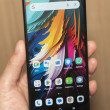Review: Samsung Galaxy S6 Edge for AT&T
Screen
The S6 and S6 Edge both sport a 5.1-inch quad HD screen. The Edge's display wraps around the side edges just slightly. The display relies on Samsung's OLED technology and it's very bright. Colors are perhaps not quite as accurate as I'd like, but that's only because Samsung likes to boost them to appear more intense. The size and resolution are a match made in heaven. The pixel density is incredible; everything on the screen is razor sharp. I found the display quite easy to read outdoors, even under sunny skies. You can't ask for a much nicer display in a modern smartphone.
Signal
I was genuinely impressed with how the S6 Edge performed on AT&T's network. In my tests in the general metro NYC region, the phone maintained a strong connection to AT&T's LTE service. Not once did the device lose its connection, though it did drop to HSPA a handful of times in areas lacking LTE coverage. The device always connected calls on the first dial and did not drop nor miss any calls, either. Apps downloaded swiftly and the S6 Edge tackled everyday tasks like uploading photos to Instagram or Twitter in a blink. There was no discernible difference between the S6 and the S6 Edge in terms of signal performance.
Sound
Like the standard S6 for AT&T, the Edge produced better-sounding phone calls than the Sprint and Verizon models I've already tested. I was more pleased with the clarity and volume available from the earpiece. The S6 isn't the clearest nor loudest phone, but it's above average for sure. I was able to hear calls in most environments without trouble. Voice sounded good to my ears, and those I spoke with via the S6 said I sounded very good.
The speakerphone was moderately better than the earpiece for calling purposes. The speaker offered distortion-free conversations that were loud enough to hear at a soccer game.
Ringers and alerts will certainly get your attention without trouble, even if the phone is in a different room. The vibrate alert is strong enough for you to feel it in a coat pocket, backpack, or purse. When the phone is flat on a table, the vibrate alert will send it sliding sideways.
Battery
The Edge has a 2,600 mAh battery sealed inside the chassis, which is a step down from the 2,800 power cell inside last year's Galaxy S5. In my heavy-usage tests, the Edge was begging for mercy by about 9pm, or after 14 hours of active time. That's about an hour less compared to the Sprint and Verizon models. With less-intense use I saw closer to 16 hours of uptime. Again, less than the Sprint/Verizon models. This is not great battery life, to be honest.
Samsung included its Power Saver and Ultra Power Saver modes. These do make a difference if you run into trouble. The first option tones down a few features and doesn't crimp the phone's performance too much. For example, it will limit the CPU a bit, turn down brightness, turn off the key backlights, and put the display to sleep faster. The second takes a more aggressive approach and kills off all but the basics. It strips the UI down to the bare essentials, goes grey-scale, and prioritizes only key functions, such as calling and messaging. These will help you save power.
I tested the S6 Edge on two different wireless charging pads I have. It worked with both. It charged slowly, but it had no problem switching between the two different standards used by the pads. The phone is very quick to charge when plugged into the supplied wired charger.


 Review: Samsung Galaxy S6 Edge for Verizon Wireless
Review: Samsung Galaxy S6 Edge for Verizon Wireless
 Review: Samsung Galaxy S6 Edge for Sprint
Review: Samsung Galaxy S6 Edge for Sprint
 Hands-On: Samsung Galaxy S6 and Galaxy S6 Edge
Hands-On: Samsung Galaxy S6 and Galaxy S6 Edge
 Liveblog of Samsung's Galaxy S6 Launch
Liveblog of Samsung's Galaxy S6 Launch
 Samsung Debuts Iron Man Edition of Galaxy S6 Edge
Samsung Debuts Iron Man Edition of Galaxy S6 Edge
 Samsung Galaxy S6 edge (GSM)
Samsung Galaxy S6 edge (GSM)






